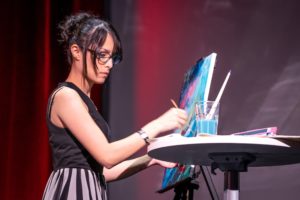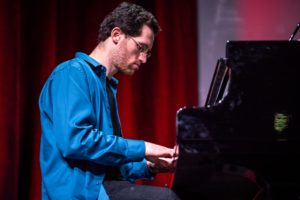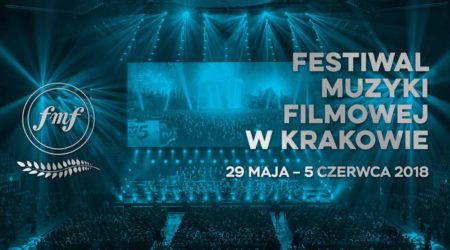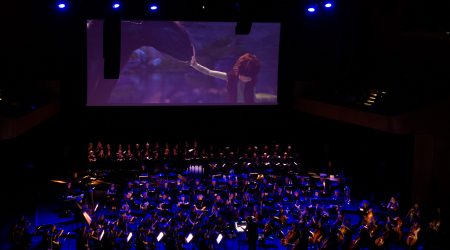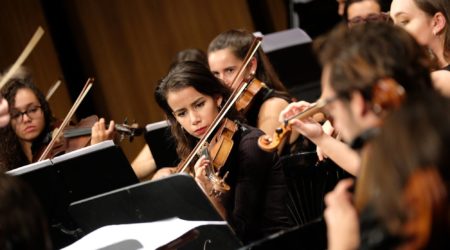The gala concert of the 2018 edition of the Krakow Film Music Festival was dedicated to music from games. One of the guests is one of the biggest names in the music for games: American composer Austin Wintory. Aside from performing his own music at the gala, he also sat at the piano during a panel with painter Angela Bermúdez, where each inspired the other creatively. They have done this idea on multiple occasions before, but In Krakow flutist Sara Andon and cellist Tina Guo joined them, which resulted in a very interesting session where the four artists tried to inspire each other with melodies, shapes and colors. I had the pleasure to talk to “The A-team,” as Angela and Austin like to call themselves, during this festival on June 1st, 2018.
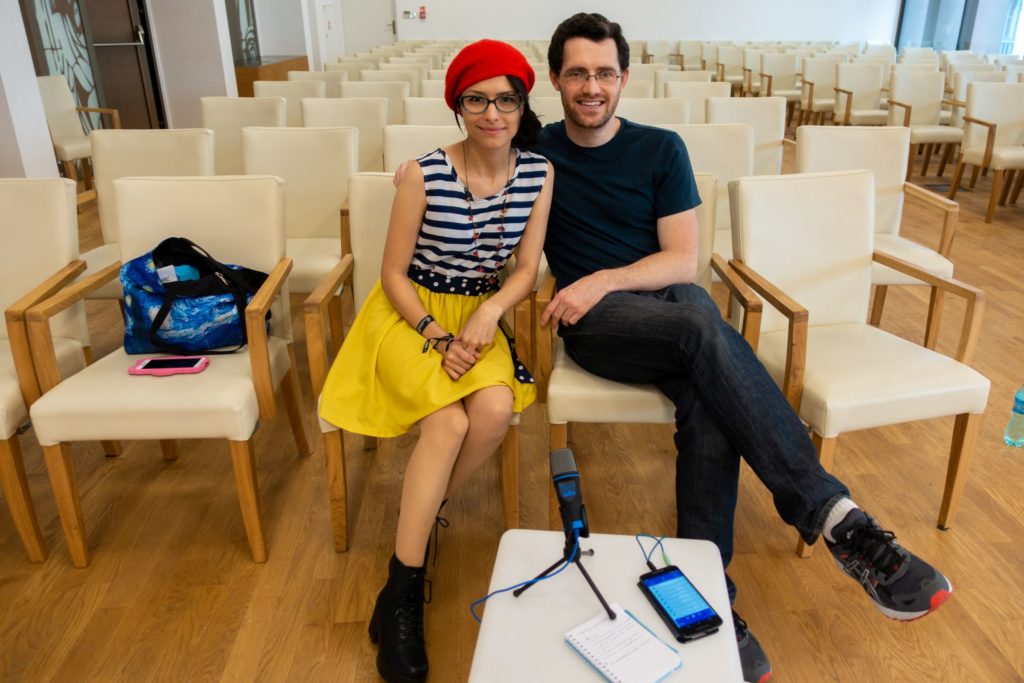
Anton Smit: Austin, let’s start with some questions for you. How did you get into this business?
Austin Wintory: I got started as a student. My first video game was a student project that Sony took notice of and asked us to remake as a Sony PlayStation 3 title. It did really well, it is called flOw, and I kind of started my career from there. It has now been 12 or 13 years and keeps going somehow.
Anton: You have written music for so many games, like Journey, ABZU, Assassin’s Creed, and Tooth and Tail. All these games are very different. When and how do you get started musically on a project?
Austin: It is different for every project and that is part of why they end up so differently, because even the starting position will change from game to game. I always try to ask myself what makes sense for this game, and what is it telling me? You mentioned Tooth and Tail, that was an interesting one, because the creative director that is this guy named Andy, and he is a good friend – we also did a game together called Monaco – and he said strategy games are very much about fighting each other, but what if it was more like flirting with each other? He said image that our game is played by a bunch of teenage boys. How do you make a bunch of teenage boys feel like they are almost being romantic with each other? It was kind of a joke, but it got me thinking about it being an interesting idea. Then we started this notion of the fighting as a dance, which of course I already had thought a lot about for Assassin’s Creed, but this was a new strategy game and a different kind of game entirely and a different kind of music. That core, that genetic foundation of combat as dance, not just a dance, but a flirty dance, like a tango, where you are connecting chemistry in an almost erotic kind of way. It was like, okay let’s explore that idea and see where it goes. Of course, you would never have a conversation like that on Journey, ABZU or something, you start with something totally different. It is just a matter of looking at the game and saying, what does it want, what would work?
Anton: Since you have scored for games of all sizes, is there a big difference in scoring for big games like Assassin’s Creed and small games like flOw?
Austin: No, obviously, the budget is very different, but at the end of the day not really. I mean especially on Assassin’s Creed, for example, I am working primarily with the audio director and the music supervisor. So my primary interaction is still with two main people. In the way they like to work is if a producer, a designer or one of the executives has feedback on the music, they will tell the audio director and she will tell me. So everything funnels through her, it is not like I am talking to a room of twenty people and trying to figure out how to make them all happy. Sometimes that does happen, but it wasn’t the case on Assassin’s Creed. Everything went through one person. So it felt no different from working with a small team, because I was still mainly interacting with just a couple of people. At the end of the day, it is not necessarily that different from a huge to a small project. Usually, it is just a few people sharing ideas, trying to do a good job. You finish and hope you succeeded.
Anton: Since you have also composed music for movies, is there a big difference between movie directors and game developers?
Austin: I thought about that a little bit in the past, and it is hard to say. I would say there is a lot of diversity in both sides about what they are interested in. For example, there is a lot of game developers, who all the references they bring up, that they like or are effective, are from movies, but there are other game developers that will reference only other games. In the case of one company, they are referencing poetry and art and things like that – more than anything else. I never had a filmmaker, for example, reference a video game as a way to kind of help us get on the same page. I think films tend to be more about film or about other arts, whereas games are about games, films or art, they are about anything. In terms of actual individual directors versus game designers, that kind of thing, it is hard to say if there is a general difference between them. I don’t think so. I mean at the end of the day, they are creative people trying to make something that they think is good, and they are nervous about it and they are scared if they are succeeding, or if they are making the wrong choices and all that kind of thing. Most of them will say things like “Look, I do not know anything about music, so help me!” That is true for film, for games, whatever. You just try to do the best that you can.
I hate to give you a kind of a generic answer, but I don’t know that I have observed consistent differences. I think maybe one thing is that games are a newer art – it is younger. Games are only thirty years old, give or take. Films have been around for over 100 years. There is an atmosphere of experimentation in games that is a little bit more than in film. Films have a hundred of years of parents and grandparents to look to for inspiration. In games, there is a lot less and as a result it is kind of like we are inventing the rules right now, and that is fun. That might be a little bit of a difference. They might be slightly more conservative in movies. Even as I say that, I have worked with some directors like Paul Solet – we have done three movies together now – and his number one rule is always that there are no rules. Normally I only hear that from the game people, but there are filmmakers like that too. The general answer is I do not know if there is a huge difference. Everyone is trying to be creative.
Anton: Now to the both of you. Angela, could you give a short introduction of who you are and what we can expect from the improvisation panel?
Angela Bermúdez: Well, I am Angela Bermúdez a painter from Costa Rica. I am here with Austin because we have this improvised dynamic between art and music.
Austin: The idea is, we tell a story, as a pair, that we are making up right there in front of the audience and we also use no words. The story comes to life on the canvas and through the piano and in the case of this performance there will also be a cello, played by Tina Guo, and flute from Sara Andon. The four of us become then equal storytellers, but with no pre-planning whatsoever.
Anton: So everything is improvised?
Austin: A hundred percent. To me the most remarkable part is that people are accustomed to musicians improvising – that is normal. A painter improvising in front of an audience is the part where people say “I never saw that before.” It is amazing that it is even possible. I always thought paintings took weeks or months of the painter sitting there, looking and being frustrated, and I had this very kind of romantic image of the struggling tortured artist. She just stands there and she can feel all that, but it can come to life. We did it in London just a couple of days ago and the painting took twenty minutes, and it is a full painting: it is not just quick, messy dashes. There is detail, there are layers and lots of color that bleeds from one to the next. It is completely mind-blowing that she can do this.
Anton: So who is starting the session, the musician or the painter?
Angela: Normally we just decide in the moment. There is no rule.
Austin: Exactly, sometimes she’ll start and I just kind of watch for a minute. In the case of London, she was still kind of preparing her paints and stuff and getting in the zone, so I just started playing. In that case I am just playing completely off the top of my head, with no idea, no anything. It gives her a very random starting point. It would be like if you opened up your iTunes and you set it to play any random track and see what happens. There is no method to it, it just is something there. She starts from that but then very quickly, as I see her painting, I start changing what I am doing, based on what she is painting, but, of course, she does the same. It is like a circle, a feedback loop. It is exciting but scary, because this could be terrible.
Angela: The first minutes we are there with our minds completely blank. But quickly we follow a path together. It is not like Austin is playing something specific and I am painting something on my own.
Austin: Yeah, as if it is just two performers sharing the stage that have nothing to do with each other.
Angela: Yes, we build some idea together.
Austin: It is one of those things that we have done it now a bunch of times in countries all over the world, and yet there is a certain fear that this time it is not gonna work. I feel like every time we start, we think is this going to make sense or be interesting? You never know, because there is literally no safety net. There is no “Well, if it sucks, I’m just gonna play Journey”
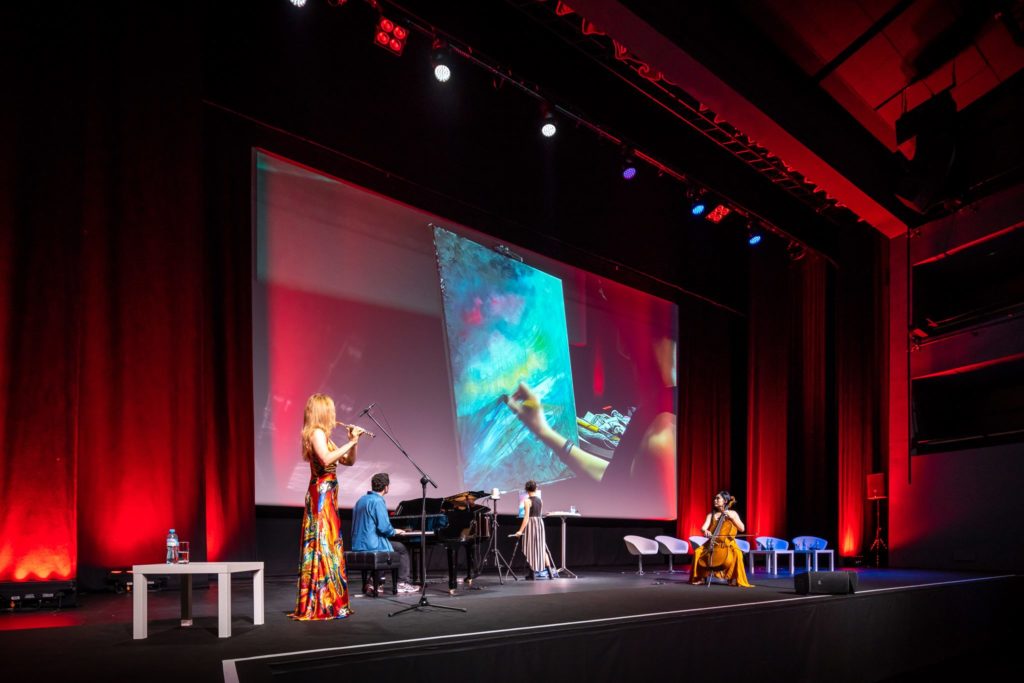
Angela: Even more when we have more people, like this time with Tina and Sara. I don’t know if they are going to feel something different from Austin.
Austin: Absolutely, the more you add. . . even just one other musician, you are adding a whole lifetime of thoughts and ideas. Which means that three notes may make them go somewhere wildly different and then they pull the whole performance there, and Angela will end up painting completely different than if it had just been the two of us. Four people, that is the most we have ever done. I guess it will be the third time now with four musicians. We did it once with a flute player and a percussionist, and we also did one with piano, with me, and two guitarists. The guitarists though, they took it kind of easy for most of it, and the piano ended up being the lead a little bit, but not planned. But cello and flute and piano are all used to being the leader so we will see what happens: it could be like fighting!
Angela: They are going to fight and I am going to be crazy, but I am prepared!

